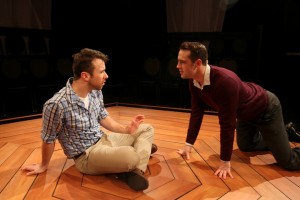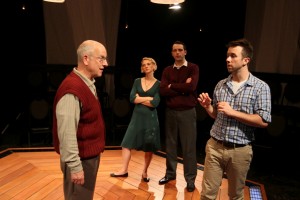
Finding love and self-knowledge beyond the fixed categories of sexual identity (gay, straight, or bi) is the central theme of Michael Bartlett’s COCK, now in its Philadelphia premiere at Theatre Exile. But that’s only one of the many issues raised in this penetrating and witty play. Bartlett’s thought-provoking script also considers such universal questions as the devastating consequences of indecision; the oxymoron of fighting for love; and the paralyzing effects of separation anxiety and fear of change that result in staying stuck in a dysfunctional situation because it’s familiar and easier than taking a risk on something different—even if “it feels better.” This is all very serious stuff, which director Deborah Block and her excellent ensemble handle with equal parts psychological insight, emotional intensity, and biting humor.
John (Wes Haskell) is caught between two unnamed lovers—his partner of seven years (John Jarboe, whose character is only identified in the program as M) and the woman he slept with (Mary Tuomanen as W) during their temporary split. They agree to meet for dinner, along with M’s father (Benjamin Lovell as F), in an awkward and funny showdown to force John to choose between them and to define himself in terms of his sexual orientation (“Gay, straight—words from the ‘60s!” responds the unsure protagonist). Each is fundamentally selfish (John alternates night after night between M and W, telling each individually that he wants the one he’s with; M and W both want to win, even though they’d only be winning a man who is not fully committed to either; and F is there to support M, who should never have included him in the conversation to resolve the lovers’ triangle), and each brings his or her own gender-based biases to the situation (the shocking misogyny of M and F as they spew vitriolic epithets at W; W’s questionable accusation that F has been staring salaciously at her body).

Despite the playwright’s archetypal use of letters rather than names, these characters are very human and complex, and Exile’s actors bring empathy, nuance, and believability—along with spot-on British accents, under Melanie Julian’s skillful dialect coaching—to them and their plight. Jarboe is insulting, combative, and passionate as M; Lovell as F is offensively old-fashioned and protective of his son; Tuomanen’s W is gentle and reassuring yet firm, lonely and determined to find companionship; and Haskell is a study in painful uncertainty, a deer in a headlight who is forced to decide when he can’t, and to fit into a clear-cut identity when he doesn’t (despite Christopher Colucci’s clever sound design giving him the subliminal message of “yes, yes, yes, yes, yes, yes, yes”).
Colin McIlvaine’s bare-stage in-the-round set design, inspired by a cock-fighting pit, facilitates Block’s masterful positioning and repositioning of the actors in their ongoing confrontations, battles, and verbal attacks, and focuses the audience’s attention on the personalities and raw emotions exposed in their challenging inter-relationships. The smart device of having the characters describe their erotic encounters and states of undress, rather than to show them, also serves to underscore the palpable psycho-sexual tension instead of distracting from it with gratuitous nudity. There is nothing about this production that isn’t smart, or incisive, or in keeping with Exile’s mission to explore the human condition. October 17-November 10, 2013; theatreexile.org.

Theatre Exile just announced a one-week extension of its Barrymore-recommended production, through Sunday, November 17. Some dates are already sold out, but tickets are available for several performances throughout the extended run.